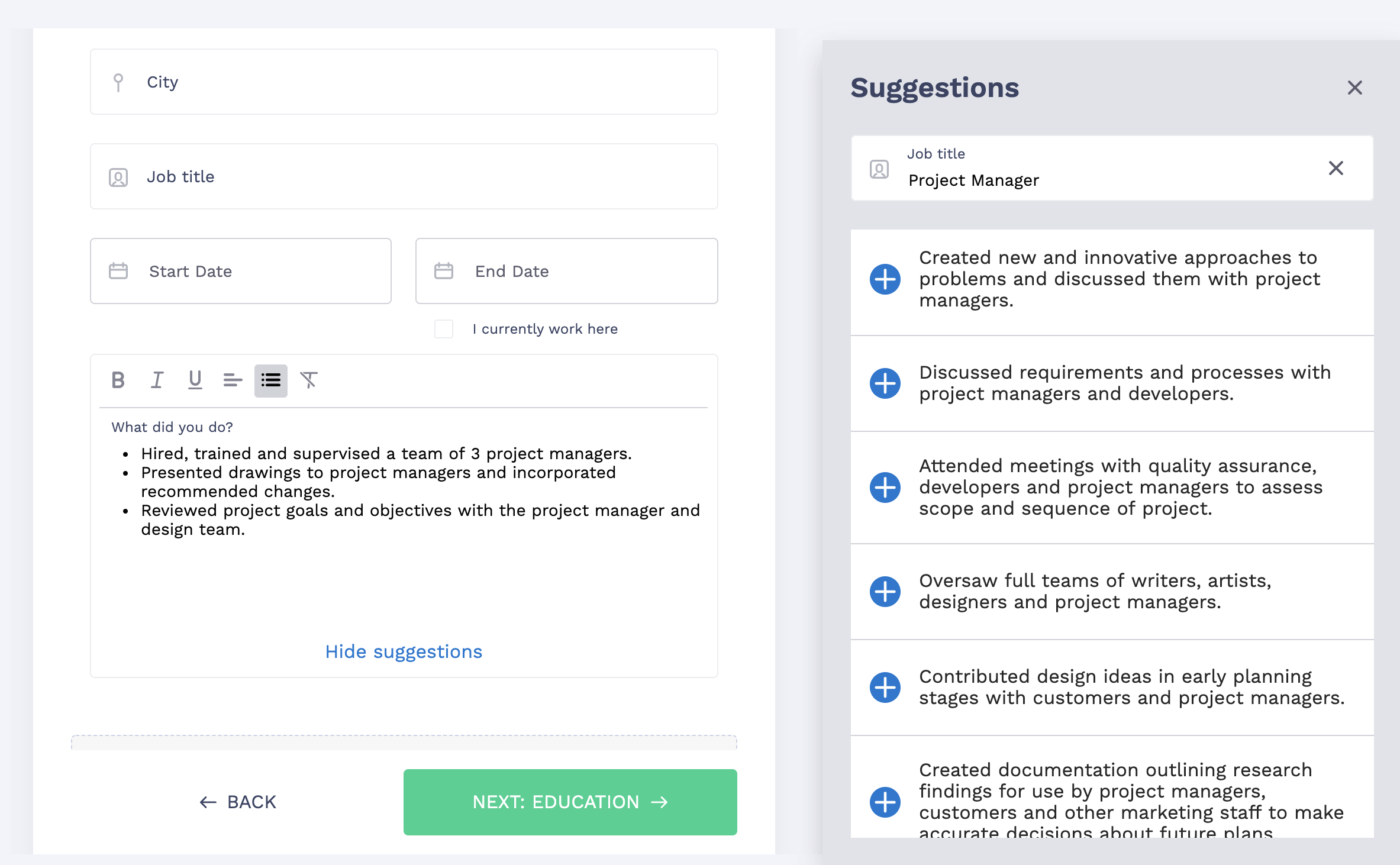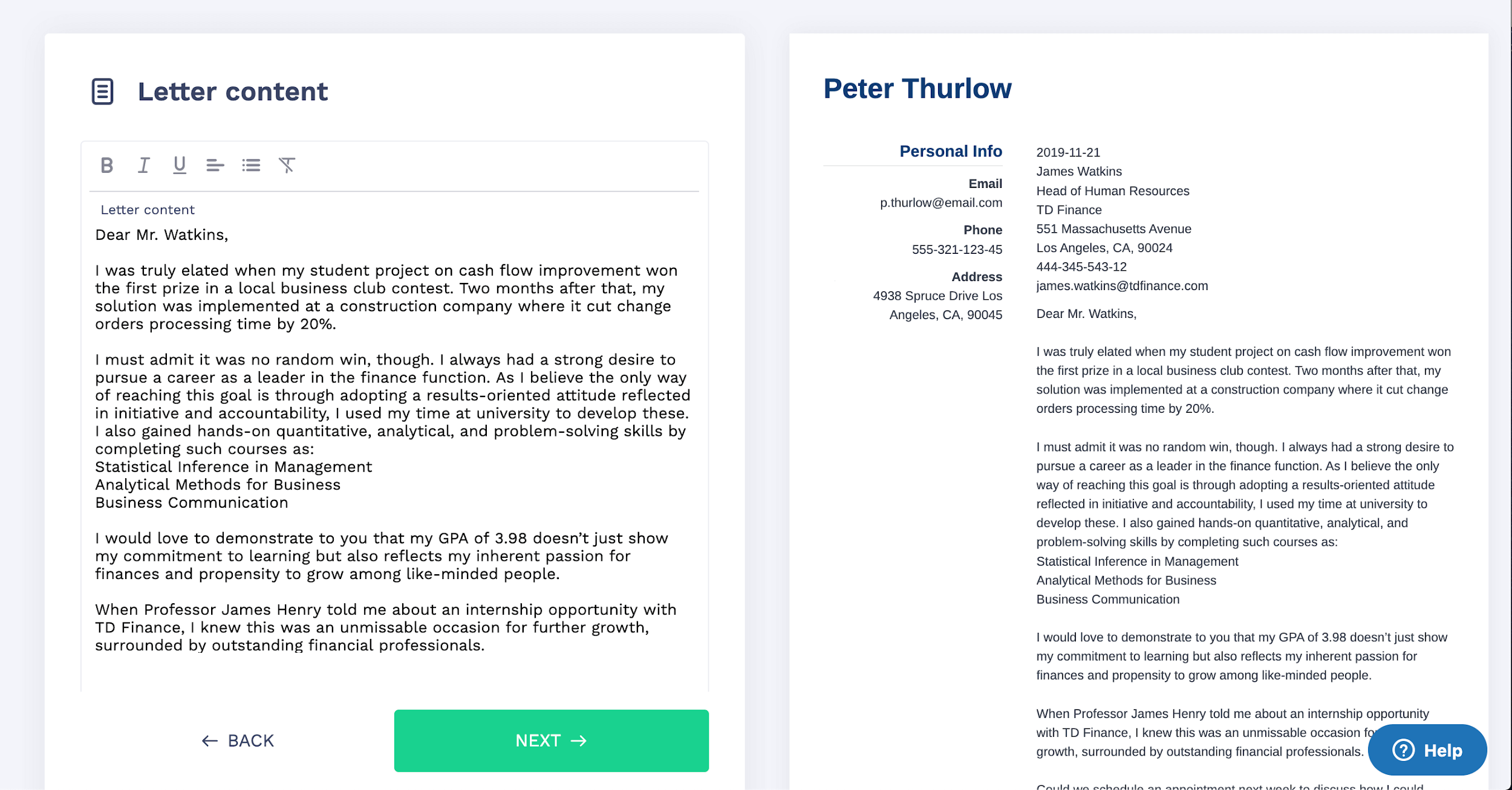Choosing a career may feel like a daunting task—
If you make a bad decision, you’re… done. For life.
Well, no, it doesn’t have to be that bad.
Not if you know how to choose a career that’s best for you.
And this is exactly what we’re about to explore.
Create my resume now

Create a job-winning resume with little effort. Hack your way through ATS software with our 18 beautiful templates—give our builder a try!
1. Identify Your Passion
In his now iconic Stanford Commencement Address, Steve Jobs said:
The only way to do great work is to love what you do. If you haven't found it yet, keep looking. Don't settle.
And he was right—
Passion should become your North Star on the way to determining what job is good for you.
Why?
Let’s put it this way:
You’re very likely to change jobs about 12 times in your lifetime, most often because you’ll become bored with what you do.
In some of these jobs, you’ll get stuck for longer.
If you don’t start with your passion, the danger is your job no.12 will feel just as miserable and boring as job no.1, and all the others in between.
And this is exactly what you'd rather avoid, isn’t it?
Obviously, in your search for a great career you will come across those who’ll tell you passion isn’t the best advisor when it comes to making career choices.
Some people will tell you to do something useful instead.
You will also bump into those who, just like professor Larry Smith, will do their best to convince you that not following your passion is the reason why you’ll fail to have a great career.
You know what?
We tend to trust the latter more.
And science is on our side, too.
A recent study of over 11,000 West Point recruits revealed that those who were motivated by passion rather than recognition and accolades had far more successful careers after graduating.
More than that—
Another study conducted collectively by the University of Pennsylvania, University of Michigan, and the United States Military Academy at West Point shows that people with high grit score, which is defined as a mixture of passion and perseverance, had higher success rates than those with lower scores.
All this boils down to one thing:
Passion, or doing the work we love, is instrumental to our long-term success and happy professional life.
Mind you though—
If you're passionate about music, you don't have to start a band and become a musician. You can just as well be a record store owner, work as a music journalist, become a sound engineer, or work as part of tech crew.
The posibillities are endless.
So if you haven’t found what it is, keep looking.
Start volunteering and interning for roles you find interesting as early as possible, even as a teenager. It's very important to figure out what you want to do before you choose to pursue a college education. A lot of it will be trial and error but that's the best way to find out what it is you love doing.
2. Plan Ahead
Sorry to disappoint you—
Passion is vital. But it’s hardly enough.
What you need is a plan.
Without developing an actionable plan you’ll end up daydreaming, rather than pursuing a satisfying career.
One way of making a plan is to imagine what you want to be doing for a living and take it backwards from there.
Say, you love photography and want to live off YouTube tutorials you make.
This sounds like a passion.
But—
What’s the plan?
Maybe it’s a good idea to get a summer job as a photographer’s assistant to learn the craft? Maybe working as a kitchen porter to put some money aside for a new lens is acceptable? Maybe getting hired as a marketing intern to see how online marketing works is OK? Maybe networking with like-minded people makes sense?
The point is to reverse-engineer the career you’re passionate about into its component parts. Then create a list of things you need to learn and do to achieve your goal.
But beware—
Your plan will rarely go smoothly.
You will face obstacles. You will get disappointed. You will want to give up on occasion.
Luckily, you can test how likely you are to soldier on.
How?
Measure your grit score.
The University of Pennsylvania lets you use this test to see where you are on the Grit Scale as developed by Dr. Angela Duckworth, one of the authors of the original grit study.
What does the test show you?
It lets you see whether or not you’ve got enough perseverance to keep chasing your dream career, however hard it may become at times.
If you’re unhappy with the score, there are at least a couple of ways in which you can increase grit.
3. Define Your Expectations
Professor Barry Schwartz has devoted much of his time to exploring what it takes to lead a happy life.
In his 2004 study he suggested that in order to avoid disappointment, self-blame, and, ultimately, unhappiness, we ought to control our expectations by adjusting them to certain reasonable standards.
In his TED Talk, viewed over 12 million times to date, he humorously paraphrased his findings by saying that the secret to a happy life are low expectations.
How does this tie in with choosing the right career?
Imagine you have two passions: painting and finances.
Now—
If the life you expect to live includes a bottle of Château Lafite from time to time, you’d be better off pursuing a career of an investment banker who paints in their free time.
But, if the lifestyle of a street painter who knows how to get by on a shoestring budget is what appeals to you, you’ll surely have a happier life as an artist.
And it’s not like one lifestyle is better than the other—
The choice is yours.
What matters, though, is to choose a career that will allow you to live the life you expect.
So, consider all your interests, strengths, and passions. Ask yourself what kind of life you want to live and define your expectations.
But make sure they’re realistic.
After all it’s better to be positively surprised by your success than bitterly disappointed by failing to come up to your bloated expectations.
4. Count the Money
Cut to the chase:
The Jobseeker Nation Survey reveals that inadequate compensation is the #1 factor for leaving a job.
Which makes perfect sense: if the money you earn is insufficient to live the life you expect, you change the job.
So—
Once your expectations are in place, you must find out if the career you wish to pursue will earn you enough to buy food and pay your bills.
Here’s a couple of ideas on how to get at least a ballpark figure:
The Occupational Outlook Handbook from the BLS is a good starting point for you to explore salary stats for a variety of occupations.
Glassdoor is another great source of information on salaries.
If you’re considering a less orthodox career, and would rather become a YouTuber, just google something along the lines of how much does [your favorite youtuber] make.
You’ll get answers like this one or this one. Yes, the numbers are impressive but it takes a lot of time, effort, and perseverance to achieve this. That’s why you need to be fueled by passion and have a lot of grit.
Simple searches online like salary.com and some of the government resources will help you find out average salaries. But it’s more important to figure out your relationship to money and why you have a set amount in your mind. What is enough for you? It's easy to think you need more or less, but until you figure out what money and other resources mean to you, it's always going to be a big question mark.
To sum up:
Be realistic, choose a career that's both: aligned with your passion and that will earn you a living you expect.
And if it turns out your passion won't earn you enough—
Come up with another plan, don't give up on your passion.
The ResumeLab builder is more than looks. Get specific content to boost your chances of getting the job. Add job descriptions, bullet points, and skills. Easy. Improve your resume in our resume builder now.
CREATE YOUR RESUME NOW

Nail it all with a splash of color, choose a clean font, and highlight your skills in just a few clicks. You're the perfect candidate, and we'll prove it. Use our resume maker now.
5. Explore Unknown Territories
Here’s the thing:
There are many jobs out there you might not have ever heard of.
And lots of them could be perfectly in line with what you’re passionate about.
The problem is—
How to find out what’s available?
One way of exploring what jobs there are is by using Occupation Finder on the BLS website.
It’s a long table that lists several hundred different occupations along with such information as educational requirements, projected number of new jobs, or growth rate.
Plus—
If you click on any job title you see there, you’ll get info on what the job involves, what work environment you can expect, or what the employment of a given job looks like in each state.
In other words, there’s a lot to explore.
You can also try googling something like: jobs for [your interest].
Some results will direct you to job boards, which is great because you’ll have a chance to see what positions are available and what skills they require. If you come across something of interest, you’ll be able to start planning how to get there.
Some results will show you lists of ideas for you to explore.
One more thing—
Technology is developing at such a fast pace that it’s estimated that about 25 million new jobs will be created over the next couple of years, and new occupations will come into being.
Let's just say that web developers, SEO experts, or UX/UI developers didn’t exist 15 years ago.
And even though we can’t be sure what the future holds, it’s likely that there will be plenty of opportunities for engineers, data analysts, and all those who’ll be in the business of the Internet of Things.
6. Ask Around
Listen:
Once you come across a job you think you’ve been cut out for, you may inadvertently start glamorizing it, only to end up with an entirely wrong idea of what this is all about.
In fact, 41% of those who left their jobs within the first 90 days say the role wasn’t exactly what they expected. (As you can see, the right expectations really are of utmost importance.)
So don’t jump the gun. Take it easy, and reach out to the people who can help you understand the true nature of the job.
Easier said than done?
Not if you know who to ask and where to go.
Here’s a couple of ideas you can test out:
The quickest way of finding the information on Reddit is to google something like [job title] reddit or work at [place] reddit. You’ll get a whole bunch of results that’ll redirect you to relevant discussions as well as AMA threads.
Finally:
It’s always a good idea to ask people for an informational interview via LinkedIn. In other words, ask them to tell you about the job they happen to be doing, and you happen to be interested in. This kind of interview gives you an opportunity to corroborate all the information you found by yourself, including the salary.
Informational interviews are a great thing and job seekers should utilize them as much as possible. They provide an inside peek or “free sample” into a company and role that you might be interested in. It’s great to test the waters first, before jumping straight in.
Before you start sending out invitations to connect, learn how to use LinkedIn like a pro so your profile encourages people to become a connection of yours.
7. Don’t Fully Trust Career Quizzes
We live in strange times.
Google gets asked what’s the weather like today more than 200,000 times a month, when all it takes to find out is to—
Look through the window or open the door and let some fresh air in.
The same seems to be true about our ability to know ourselves.
Half a million people a month choose to take a “how to choose a career” or “what career is right for me” kind of quiz over having heart-to-heart conversations with their family members, friends, career counselors, or… simply trusting their gut feeling about themselves.
I took an online quiz of this sort the other day, out of curiosity.
I didn’t bother to choose any answer, just went along with the default ones, and, to my surprise, I found out that a career as a painter is the way for me to go. Well, if only I could paint something more than a stick figure…
I'm wary of 'quizzes' or other 'free' tools that you aren't able to research, validate or verify in some way. In my coaching practice, I only use assessment tools that have been tested, verified and meet national and international compliance standards. You should never make career decisions only based on the results from tools you find online.
To make things clear—
This is not to discount all sorts of tests that are supposed to help you in your professional life.
Tests such as Myers-Briggs Type Indicator, the MAPP Career Test or the Marlee Motivational Assessment could help you learn more about the type of personality you have, or the work environment that you’d thrive in—
But make sure the tests are selected, conducted, and assessed by trained professionals who know how to interpret the scores and relate them to you in particular.
8. Make a Job-Winning Resume
Let's sum everything up:
- You've identified your passions
- You've set your expectations
- You have an action plan
- You've talked to people
Now—
Certain stages of your career path will require you to have a resume.
The good news is that if you decide to pursue a more “traditional” career, like that of a lawyer or teacher, we have a collection of resume guides that will help you write your resume in no time.
If you need a resume that you can’t find among our resume examples, here’s how to make one that will bring out all the best in you and earn more than 7 seconds of the recruiter’s attention:
With a professional resume up your sleeve, you only need to know how to write a cover letter to match it.
9. Break the Mold
The world keeps changing. New jobs are being created, and new business models and opportunities keep springing up like mushrooms.
But even though industry disruption has become the new normal, business leaders worry they’re lagging behind in out-innovating their competitors.
So if you feel like no traditional career is right for you, don’t worry.
Prove those business leaders right and—
Become their competition.
More and more companies are looking for creative ways to work with people. If there are no traditional career options that seem right then try to find a need and create a job. Or, consider a portfolio career where you seek out opportunities that give you the experiences you want but may be spread across a variety of companies and positions.
And—
Do what you can’t.
10. Embrace the Change
We’re living in a world where change is the new constant.
Companies push innovation to the limits and we need to learn to adapt if we wish to thrive professionally.
What does it mean in practice?
You mustn't be afraid of change.
If at any point in your life you feel like your career is going nowhere. Try something different.
It may be hard, it may be slow, it may be terrifying initially. But it may turn out to be the best decision you’ve ever made.
You know—
Walt Disney used to be a newspaper editor and Harrison Ford was a carpenter.
Double your impact with a matching resume and cover letter combo. Use our cover letter builder and make your application documents pop out.
CREATE YOUR COVER LETTER NOW

Want to try a different look? There’s 18 more. A single click will give your document a total makeover. Pick a cover letter template here.
Key Points
Choosing a career is not an easy task to accomplish, especially when you have no idea what you’d like to do with your life. The following steps will help you find a way:
- Start with identifying what you’re passionate about. Without it, you won’t be able to do great work.
- Prepare an action plan. Take your passion apart into its component parts and find out what exactly you need to do to get where you want to be.
- Verify your expectations. Consider what it really is that you from life. Money? Freedom from stress? A certain lifestyle?
- Get down to earth and see how much money you’ll be able to make. Is it enough for your needs?
- Explore what jobs are available out there. Chances are you’ll discover a career you never even thought existed.
- Talk to people who do the job you’re interested in. They’ll tell you what it looks like from a practical point of view.
- If you want to get to know yourself better, don’t take online quizzes. Seek advice from your loved ones or trained professionals.
- Make sure your job application stands out from the crowd. Prepare a job-winning resume and write a captivating cover letter.
- Don’t be afraid to break the mold. If you cannot find a traditional career path that’s right for you, make one for yourself.
- Accept the change and don’t be afraid to reshuffle your life if you feel stuck in a rut. Check out these career change resume examples.
Do you have any questions? Would you like to share your advice on how to choose a career? We’d love to hear from you. Give us a shout out in the comments below.







![Entry Level Resume Examples & Template for 2026 [+Tips]](https://cdn-images.resumelab.com/pages/entry_level_listing.jpg)


